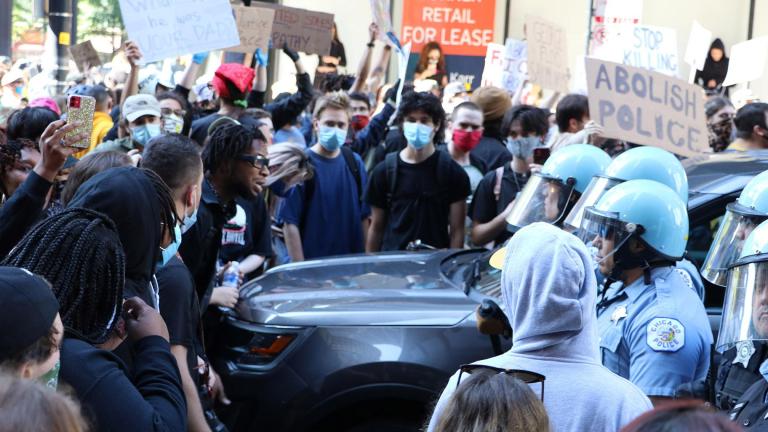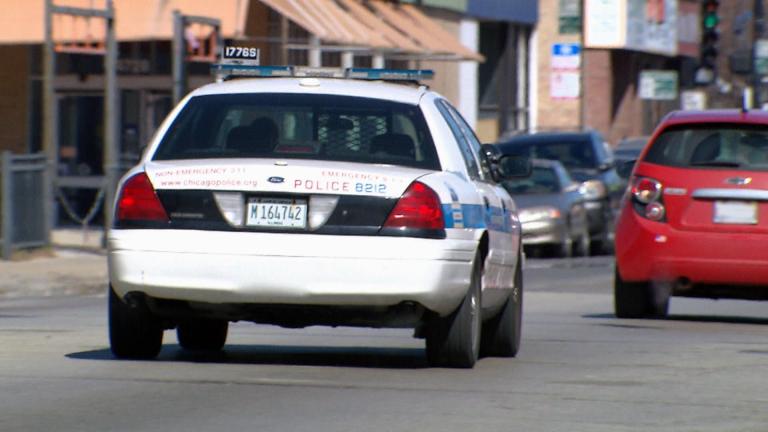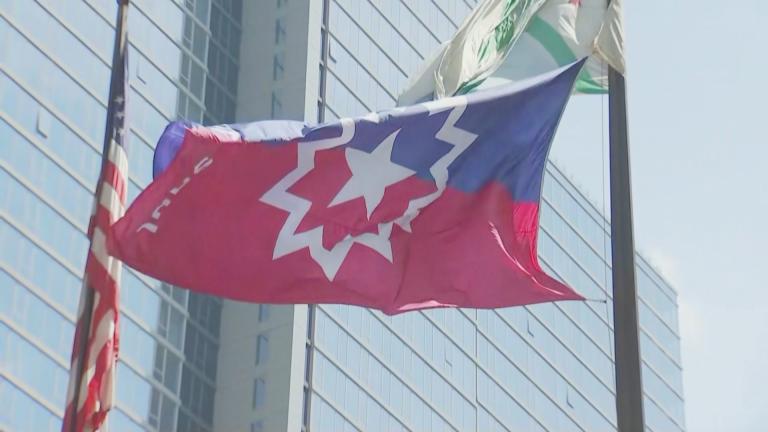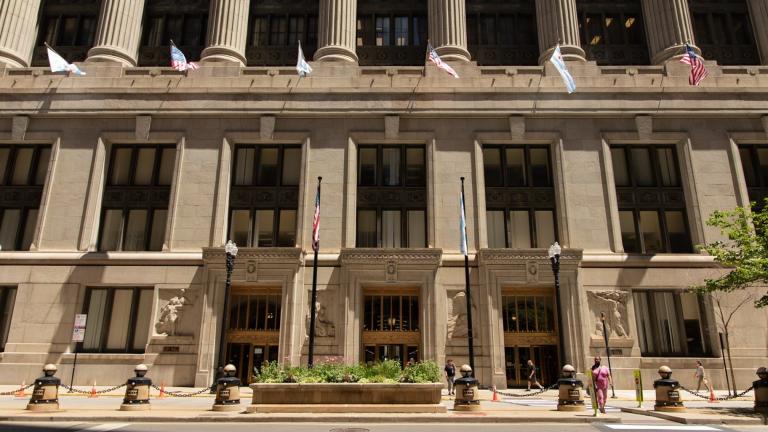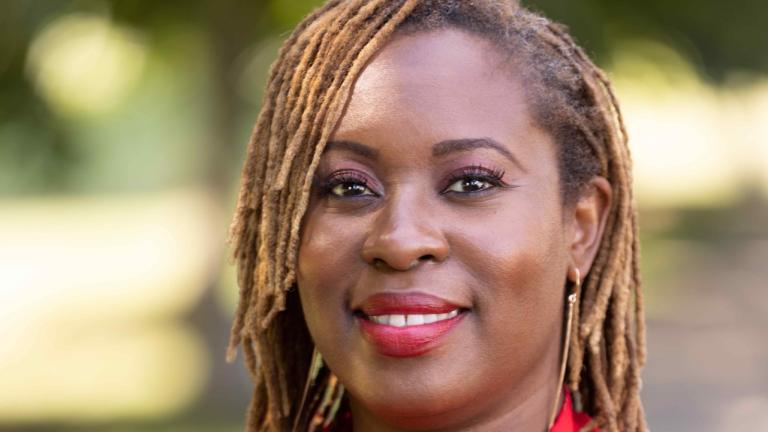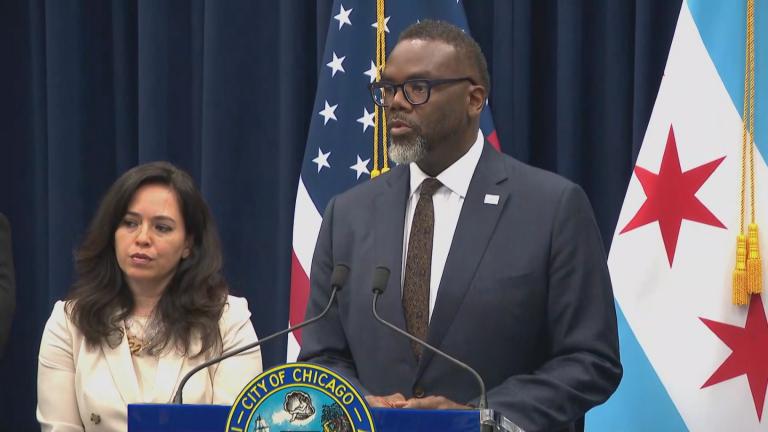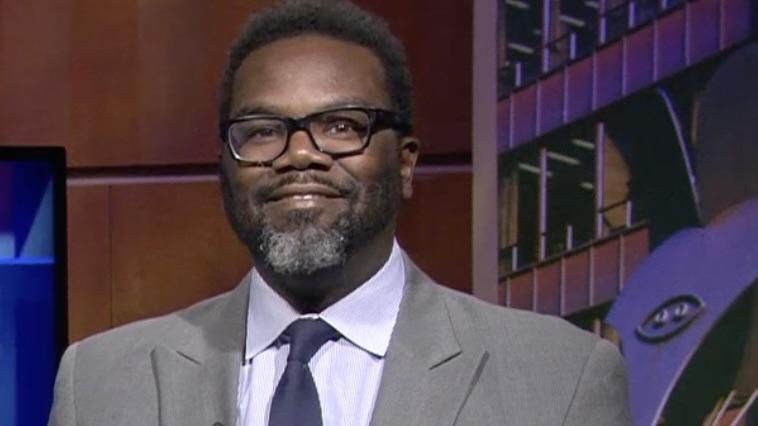
Cook County Commissioner Brandon Johnson announced Tuesday he is exploring a possible run for Chicago mayor, taking the first step toward confronting Mayor Lori Lightfoot with a serious challenge from the progressive wing of the Democratic Party.
Johnson, 46, told WTTW News that he had been overwhelmed by calls from Chicago’s progressive and labor community to run for mayor, as well as their certainty that he was the best candidate to emerge from the crowded field and defeat Lightfoot, who is running for a second term.
Johnson notified the Illinois State Board of Elections that he will use his Friends of Brandon Johnson campaign committee to explore a run for Chicago mayor — while seeking re-election to the Cook County Board of Commissioners.
Johnson said he and his wife “wanted to make sure there is enough gas in the tank” by gauging the support before announcing a campaign.
“This is a very urgent moment,” said Johnson, who lives in Austin with his wife and three children, who attend Chicago Public Schools. “Families like mine are awaiting this city’s political executive leadership to act with urgency.”
Johnson declined to set a deadline to decide whether to launch a campaign for mayor, nor would he say how much he wants the exploratory committee to raise.
“Everything is propelling us toward an announcement,” Johnson said. “It’s coming. It’s happening.”
Johnson, first elected in 2018 to represent Cook County’s 1st District on the Board of Commmissioners, was unopposed in June’s Democratic primary. Johnson, who will face Libertarian candidate James Humay in November’s general election, is expected to coast to victory in a heavily Democratic district that includes Chicago’s West Side and Oak Park.
As a member of the Cook County Board of Commissioners, Johnson is best known for authoring a measure that sought to prevent landlords from refusing to rent housing to people with certain criminal records. Johnson said the measure was designed to help county residents returning from jail or prison rebuild their lives.
Johnson also authored a nonbinding resolution in the summer of 2020 that called for county officials to “redirect funds from policing and incarceration to public services not administered by law enforcement that promote community health and safety equitably” after the police murder of George Floyd touched off a wave of social justice protests and unrest.
The Cook County Board has earmarked $65 million for violence prevention plans during the next three years to address the root causes of crime, and prevent people from reoffending.
If he does enter the 2023 race for mayor, Johnson will have the inside track on winning the backing of the politically powerful Chicago Teachers Union that has long been at loggerheads with Lightfoot over a host of issues. In the 2019 race, the union endorsed Cook County Board President Toni Preckwinkle, only to see Lightfoot win every ward and 74% of the vote.
Johnson is following the playbook that Preckwinkle used in 2018. Preckwinkle announced she would explore a bid for mayor committee shortly after Labor Day, before formally launching her bid in late September.
Johnson is a paid organizer for the teachers’ union, and appeared alongside union President Stacy Davis Gates at the City Club on Aug. 22 when she announced that she would not challenge Lightfoot — but left no doubt that she believes the city needs new leadership.
Johnson taught social studies and reading at Jenner Academy Elementary and Westinghouse College Prep.
Johnson acknowledged that his close ties to the Chicago Teachers Union would be an issue if he does run — but suggested it would be no different than other candidates running for the city’s top job after working at one of the city’s largest law firms or companies.
Before her election, Lightfoot was a partner at the prominent law firm of Mayer Brown.
Chicago needs a “visionary, game-changing executive” to represent working people across Chicago, Johnson said.
In the 2019 contest, both Lightfoot and Preckwinkle claimed to be the true progressive in the race, and took many of the same policy positions. For example, both candidates vowed to push to change state law to allow Chicagoans to elect members of the Chicago Board of Education.
But Lightfoot fought legislation to create a 21-person elected board by 2025, and Gov. J.B. Pritzker signed it over her objections — a sign of the CTU's political muscle.
During the campaign, Lightfoot vowed to reopen public mental health clinics closed by former Mayor Rahm Emanuel — but did not do so after she took office. Instead, Lightfoot has expanded city funding for nonprofit organizations that provide care and counseling.
“You can’t just claim the label” of progressive, Johnson said, without naming Lightfoot. “People said they would deliver — but the question is, have they?”
The victory of state Rep. Delia Ramirez, D-Chicago, in the Democratic primary to represent the 3rd Congressional District in June could provide a template for Johnson, if he can win the backing of not only the well-funded Chicago Teachers Union, but also Chicago’s progressive political groups, including United Working Families.
The leaders of United Working Families coordinated the efforts of several progressive groups to create networks of volunteers to go door-to-door in their own communities on behalf of Ramirez and other endorsed candidates. Davis Gates is the co-chair of the group.
Even as Ramirez faced concerted attacks over her call in the summer of 2020 to defund the Chicago police, that criticism failed to resonate with voters — and she won approximately 66% of the vote, even in DuPage County.
That showing could defuse concern that Johnson’s support for similar measures could harm him in the Feb. 28 contest. If no candidate wins a majority of the vote, the top two finishers will head to a runoff on April 4.
Lightfoot has long predicted that the CTU would field a progressive candidate in 2023 in an attempt to unseat her — and has said she is ready to defend her handling of the COVID-19 pandemic, rooting out corruption at City Hall, fighting crime and boosting public investment on the South and West sides.
Johnson’s action on Tuesday means he can raise nearly unlimited amounts of money for a mayoral bid. Businessman and philanthropist Willie Wilson lifted the state-imposed contribution limits the day after he launched his third bid for mayor by contributing $5 million to his campaign. Since then, Wilson has contributed an additional $1 million.
At the end of June, Johnson had $84,000 in his campaign account, according to records filed with the Illinois State Board of Elections.
Eight candidates have already announced bids for mayor, including Lightfoot and Wilson: Ald. Raymond Lopez (15th Ward), state Rep. Kam Buckner (D-Chicago), Paul Vallas, Ald. Roderick Sawyer (6th Ward), Ja’mal Green and Ald. Sophia King (4th Ward).
Contact Heather Cherone: @HeatherCherone | (773) 569-1863 | [email protected]

